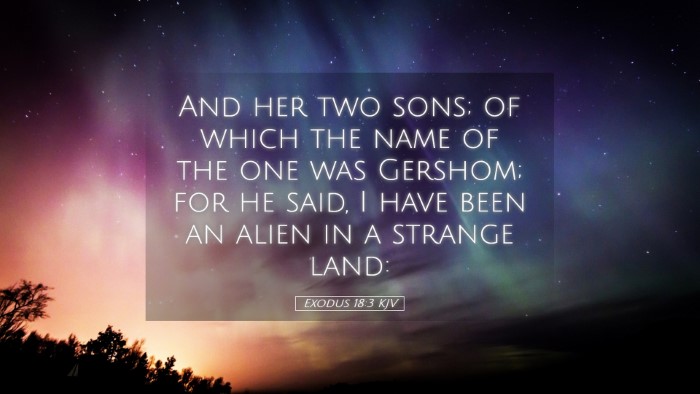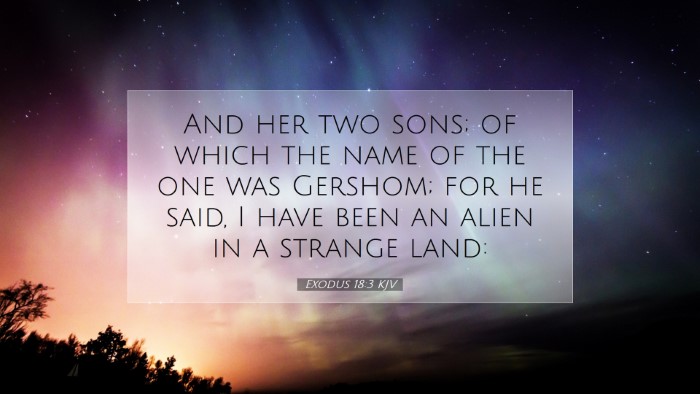Commentary on Exodus 18:3
Verse: Exodus 18:3 - "And her two sons; of which the name of the one was Gershom; for he said, I have been an alien in a strange land: and the name of the other was Eliezer; for the God of my father, said he, was mine help, and delivered me from the sword of Pharaoh."
Introduction
This verse, nestled within the larger narrative of Exodus, contains significant insights into Moses' familial relationships and his personal journey. The names of Moses' sons, Gershom and Eliezer, are not just identifiers; they bear the weight of Moses' experiences and the divine providence he has encountered. By examining the meanings of these names and their context, one can draw profound theological and practical lessons.
Moses' Sons: Symbolism and Meaning
Moses names his sons intentionally, reflecting his personal experience and spiritual journey. The name Gershom means "a stranger there," which directly relates to Moses' time spent in the land of Midian after fleeing Egypt. Matthew Henry comments on this, noting, "He was indeed a stranger, and therefore he named his son Gershom, declaring it to be a sign of his affliction and his transition from one state to another." This name encapsulates the essence of life in exile, resonating deeply with a theological understanding of alienation and the quest for belonging.
The second son, Eliezer, whose name means "God is my helper," indicates a shift in Moses' perspective. Adam Clarke remarks, "This name signifies the help of God in times of distress; this was a testimony to the faithfulness of God, who had delivered Moses from the dangers he faced." The naming signifies not merely a historical event but the continual assistance and sovereignty of God throughout Moses' life.
Theological Implications of the Names
- Identity in Exile: Gershom's name reflects the human condition of spiritual and physical exile. Albert Barnes notes that it conveys "the notion of being an outsider in God's plan, illustrating the wider narrative of God's people throughout history." This serves as a reminder for believers of the transient nature of life and the enduring hope found in faith.
- God's Faithfulness: Eliezer represents the essential characteristic of God as a helper. Clarke points out that it is a declaration of God's ongoing deliverance in Moses' life, implying that hardship comes with the promise of divine presence and assistance.
Pastoral Insights
For pastors and leaders, this passage offers profound pastoral insights. The experiences encapsulated in the names of Moses' sons can serve as a reference for congregational teaching:
- Relating to the Congregation: Understanding the experience of being in exile can empower pastors to connect with those who feel marginalized or distant from God. By acknowledging these sentiments, they can foster an environment of belonging and compassion.
- Encouraging Faith in Trials: The recognition of God as a helper is vital for ministry, especially when individuals face significant life trials. Pastors can draw parallels from Moses’ affirmations to inspire faith and reliance on God's ongoing support.
Application for Students and Theologians
The names Gershom and Eliezer bring forth important discussions for students of theology:
- Exploring the Narrative: The examination of these names can lead to deeper insights into the character of Moses as a leader shaped by both his struggles and revelations. It prompts questions about how personal experiences influence ministry and leadership.
- Understanding Divine Help: The notion of God as a helper opens up a broader theological exploration of divine assistance throughout Scripture, inviting students to study how various biblical figures experience and articulate God's intervention.
Conclusion
Exodus 18:3 serves as a rich tapestry woven with themes of exile, identity, and divine assistance. The careful naming of Moses' sons allows readers to reflect on their own spiritual journeys, recognizing both the challenges and affirmations of faith encountered along the way. These insights can be applied in pastoral contexts and academic discussions alike, making this verse a profound source of inspiration and teaching for all who seek to understand the dynamic relationship between God’s deliverance and human experience.
As church leaders, students, and scholars delve into the meanings behind these names, they uncover not only historical context but also timeless truths that resonate deeply in the life of faith.


